Trainline Bundle
Who Really Owns Trainline?
Understanding the Trainline SWOT Analysis is crucial, but have you ever considered the hands guiding this digital rail and coach platform? From its inception by the Virgin Group to its current status as a FTSE 250 constituent, Trainline's ownership story is a fascinating journey of strategic shifts and financial maneuvers. Delving into the details of Trainline ownership reveals much about its direction.
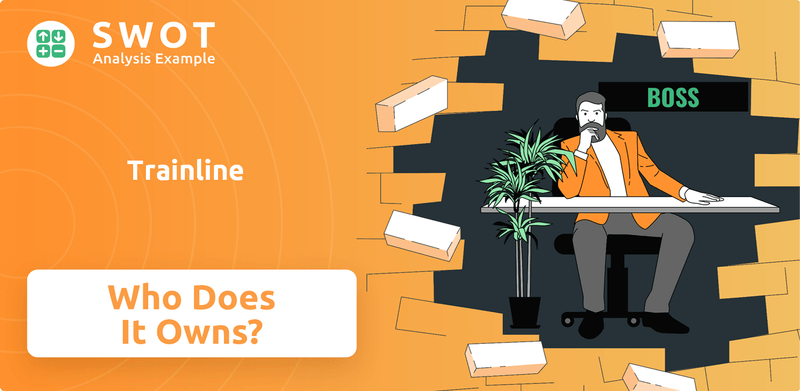
The evolution of Trainline company’s ownership provides critical context for its strategic decisions and market performance. This exploration will unravel the Trainline history, from its initial private equity backing to its public listing, highlighting the key players and their influence. Discovering who owns Trainline is essential for any investor or industry observer seeking a comprehensive understanding of this travel technology leader, including its Trainline parent company and the roles of Trainline executives.
Who Founded Trainline?
The Trainline company, a prominent player in the online rail ticket market, has an ownership history that began in 1997. Initially, the company was established by the Virgin Group, marking the start of its journey in the rail industry. Online ticket sales started in 1999.
At the time of its inception, Trainline.com Ltd was wholly owned by Virgin Rail Group Ltd, with Virgin Group Investments Ltd as its ultimate parent company. This structure highlights Virgin's early and significant role in the company's foundation. The early ownership structure was crucial in shaping the company's direction and growth.
Early in its history, Stagecoach acquired a 49% shareholding in Trainline. This investment by Stagecoach was a key development in the company's ownership structure. Later, in February 2004, Trainline merged with Qjump, its main competitor.
The evolution of Trainline's ownership involved several key events that shaped its current status. These changes reflect strategic moves and partnerships that have influenced the company's growth trajectory.
- 1997: Founded by the Virgin Group.
- 1999: Online ticket sales began.
- Early Ownership: Virgin Rail Group Ltd was the sole shareholder, and Virgin Group Investments Ltd was the ultimate parent company.
- Acquisition: Stagecoach acquired a 49% shareholding.
- Merger: Merged with Qjump in February 2004.
- Post-Merger: Stagecoach sold its stake, leading to Virgin holding an 86% shareholding, while National Express owned 14%.
Trainline SWOT Analysis
- Complete SWOT Breakdown
- Fully Customizable
- Editable in Excel & Word
- Professional Formatting
- Investor-Ready Format
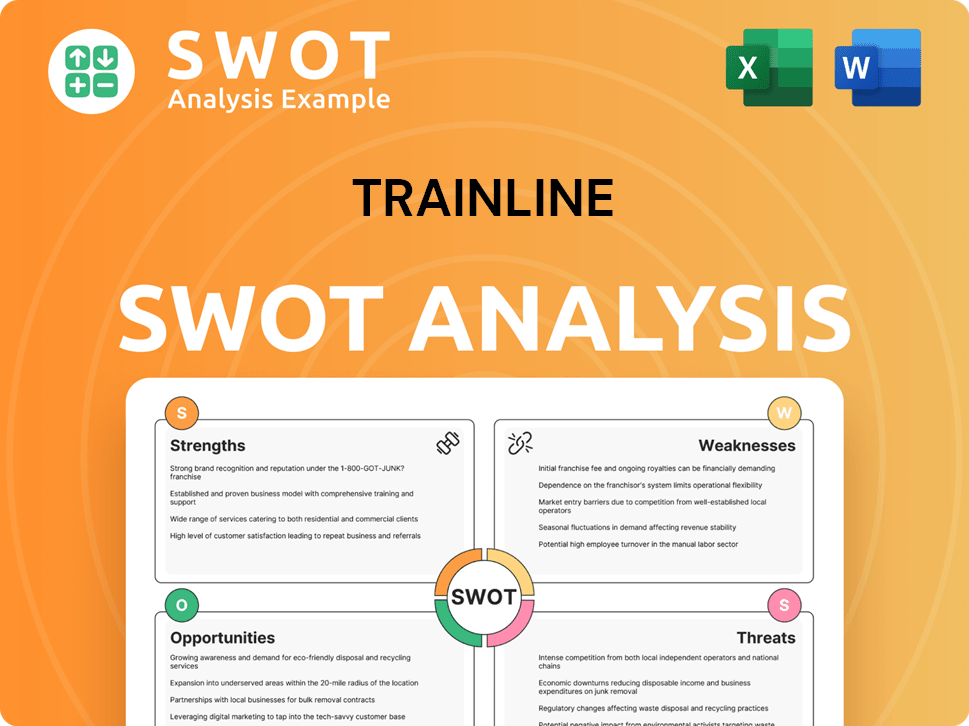
How Has Trainline’s Ownership Changed Over Time?
The evolution of Trainline's ownership has been marked by significant changes since its inception. Initially, in July 2006, Exponent Private Equity took over Trainline from Virgin and National Express. This period saw the company's growth fueled by the increasing adoption of online rail ticket sales, a general rise in rail travel, and the expansion of mobile and e-ticket transactions. Clare Gilmartin was appointed CEO in 2014, and Doug McCallum became Chairperson in 2013.
A pivotal shift occurred in January 2015 when KKR & Company Inc. acquired Trainline from Exponent. KKR, through 'Victoria Investments Bidco Ltd,' secured the majority shareholding. The company rebranded from Thetrainline.com to Trainline in August 2015. A strategic move under KKR's ownership was the acquisition of Captain Train in March 2016, which was later rebranded as Trainline EU. In June 2019, Trainline went public on the London Stock Exchange through an Initial Public Offering (IPO).
| Ownership Phase | Key Event | Impact |
|---|---|---|
| Exponent Private Equity | Acquisition from Virgin and National Express (July 2006) | Growth through online sales and mobile ticketing. |
| KKR & Company Inc. | Acquisition from Exponent (January 2015) | Strategic acquisitions and IPO preparation. |
| Initial Public Offering (IPO) | Floatation on the London Stock Exchange (June 2019) | Transition to a publicly traded company. |
As of May 19, 2025, Trainline plc (LSE:TRN) has 68 institutional owners and shareholders, holding a total of 85,684,677 shares. Major shareholders include Invesco Oppenheimer International Growth Fund Class C, SMALLCAP WORLD FUND INC Class A, and Artisan International Small-Mid Fund Investor Shares. The company's current market capitalization is approximately $1.54 billion as of June 12, 2025. For more insights into its business strategies, you can read about the Growth Strategy of Trainline.
Trainline's ownership has evolved from private equity to a publicly listed company.
- Exponent Private Equity initially drove growth.
- KKR facilitated strategic acquisitions.
- The IPO marked a significant transition.
- Institutional investors now hold a substantial number of shares.
Trainline PESTLE Analysis
- Covers All 6 PESTLE Categories
- No Research Needed – Save Hours of Work
- Built by Experts, Trusted by Consultants
- Instant Download, Ready to Use
- 100% Editable, Fully Customizable
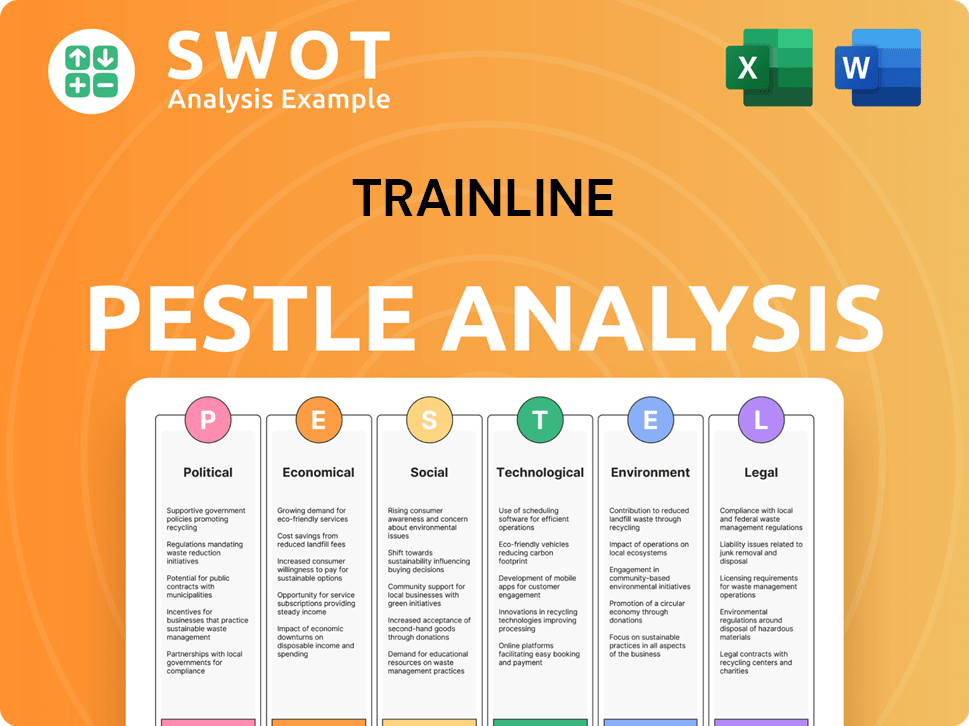
Who Sits on Trainline’s Board?
As a publicly traded entity, the governance of the Trainline company is overseen by a board of directors. Key figures currently include Brian McBride as Chairman and Jody Ford as CEO. Other significant members include Peter Wood (Chief Financial Officer), Jennifer Duvalier (Senior Independent Non-executive Director), Rakhi Goss-Custard (Independent Non-Executive Director), Marie Lalleman (Independent Non-Executive Director), and Andrew James Phillipps (Independent Non-Executive Director). The Nomination Committee ensures that all directors recommended for reappointment at the Annual General Meeting dedicate sufficient time to their responsibilities.
The composition of the board and its focus areas are crucial for understanding the strategic direction of the company. The board's priorities, as detailed in the FY2024 annual report, include talent and succession planning, promoting diversity and inclusion, and evaluating the effectiveness of the Board and its Committees. This structure reflects the company's commitment to sound corporate governance and long-term value creation.
| Director | Position | Key Responsibilities |
|---|---|---|
| Brian McBride | Chairman | Overseeing the Board and ensuring effective governance. |
| Jody Ford | CEO | Leading the company's overall strategy and operations. |
| Peter Wood | Chief Financial Officer | Managing the company's financial activities and reporting. |
Trainline operates with a one-share-one-vote structure, which is standard for companies listed on the London Stock Exchange. As of June 11, 2025, the total number of ordinary shares in issue was 427,433,632. There is no indication of dual-class shares or special voting rights that would grant disproportionate control to specific entities. For more insights, consider exploring the Marketing Strategy of Trainline.
The board of directors plays a critical role in the strategic direction and governance of Trainline. The company's structure ensures that all shareholders have equal voting rights.
- Focus on talent and succession planning.
- Commitment to diversity and inclusion.
- Evaluation of the Board and its Committees.
- One-share-one-vote structure.
Trainline Business Model Canvas
- Complete 9-Block Business Model Canvas
- Effortlessly Communicate Your Business Strategy
- Investor-Ready BMC Format
- 100% Editable and Customizable
- Clear and Structured Layout
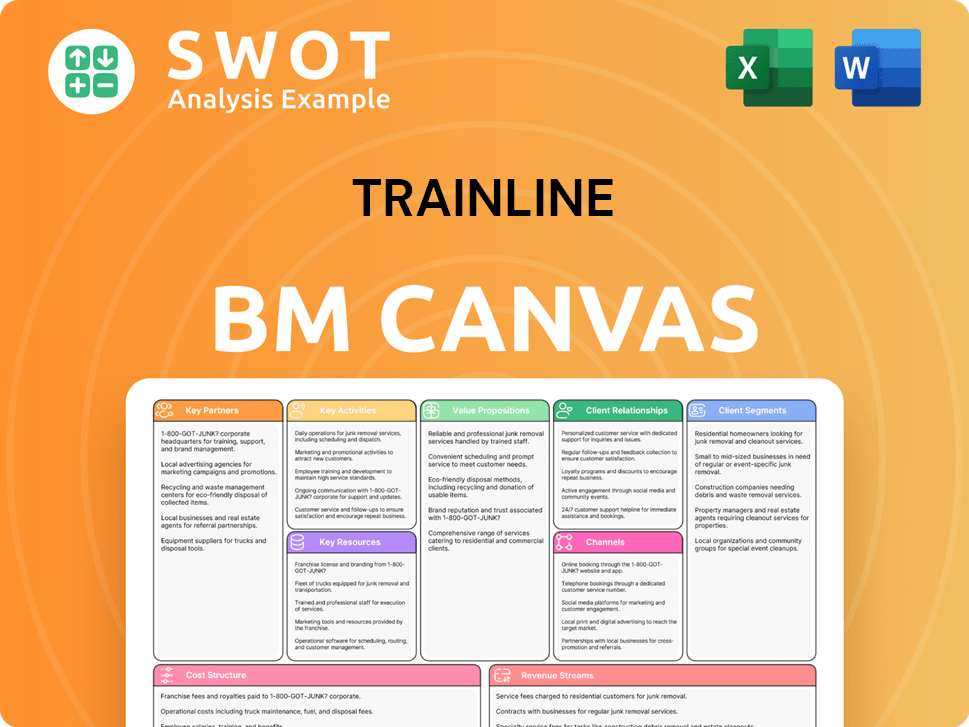
What Recent Changes Have Shaped Trainline’s Ownership Landscape?
In the past few years, Trainline has prioritized strategic investments to drive organic growth, focusing on enhancing customer experience and boosting demand for rail travel. The company has also engaged in share buyback programs to return surplus capital to shareholders. These programs reflect a commitment to shareholder value and efficient capital allocation. The company announced three share buyback programs; the third one was announced on March 13, 2025, for up to £75 million.
As of March 7, 2025, Trainline had repurchased and cancelled £69 million of shares under the second program, totaling £119 million across both programs, representing 8% of issued share capital. By June 11, 2025, the remaining number of ordinary shares in issue was 427,433,632, showing the impact of these buybacks on the company's ownership structure. This activity indicates a strategic approach to managing the company's capital and ownership profile.
| Metric | Details | Value |
|---|---|---|
| Share Buyback Program 1 | Amount | Up to £50 million |
| Share Buyback Program 2 | Amount | Up to £75 million |
| Share Buyback Program 3 | Amount | Up to £75 million |
| Shares Repurchased (as of March 7, 2025) | Under Program 2 | £69 million |
| Total Shares Repurchased (as of March 7, 2025) | Across Both Programs | £119 million |
| Percentage of Issued Share Capital Repurchased | 8% | |
| Remaining Ordinary Shares in Issue (as of June 11, 2025) | 427,433,632 |
A significant trend affecting Trainline's ownership is the increasing state-backed competition in the UK rail ticketing market. The UK government is nationalizing most passenger train operators, with the process starting in 2025 and expected to be completed by 2027. This shift could lead to greater institutional ownership in nationalized rail services. Despite these changes, Trainline reported record net ticket sales of approximately £6 billion for the financial year ending February 28, 2025, a 12% year-on-year increase, and continues to expand its international consumer business, especially in Spain, France, and Italy. These factors highlight the evolving dynamics of the Trainline company's market position.
Share buyback programs reflect a commitment to shareholder value and efficient capital allocation.
Record net ticket sales of approximately £6 billion for the financial year ending February 28, 2025, a 12% year-on-year increase.
Increased state-backed competition in the UK rail ticketing market due to nationalization.
Continued expansion of the international consumer business, particularly in Spain, France, and Italy.
Trainline Porter's Five Forces Analysis
- Covers All 5 Competitive Forces in Detail
- Structured for Consultants, Students, and Founders
- 100% Editable in Microsoft Word & Excel
- Instant Digital Download – Use Immediately
- Compatible with Mac & PC – Fully Unlocked
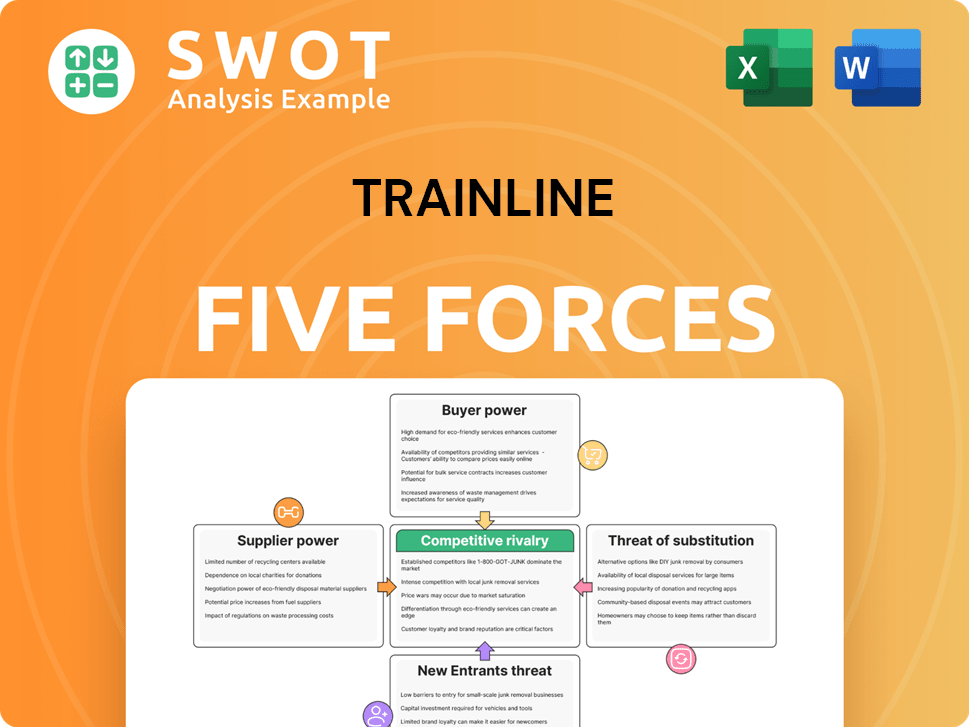
Related Blogs
- What are Mission Vision & Core Values of Trainline Company?
- What is Competitive Landscape of Trainline Company?
- What is Growth Strategy and Future Prospects of Trainline Company?
- How Does Trainline Company Work?
- What is Sales and Marketing Strategy of Trainline Company?
- What is Brief History of Trainline Company?
- What is Customer Demographics and Target Market of Trainline Company?
Disclaimer
All information, articles, and product details provided on this website are for general informational and educational purposes only. We do not claim any ownership over, nor do we intend to infringe upon, any trademarks, copyrights, logos, brand names, or other intellectual property mentioned or depicted on this site. Such intellectual property remains the property of its respective owners, and any references here are made solely for identification or informational purposes, without implying any affiliation, endorsement, or partnership.
We make no representations or warranties, express or implied, regarding the accuracy, completeness, or suitability of any content or products presented. Nothing on this website should be construed as legal, tax, investment, financial, medical, or other professional advice. In addition, no part of this site—including articles or product references—constitutes a solicitation, recommendation, endorsement, advertisement, or offer to buy or sell any securities, franchises, or other financial instruments, particularly in jurisdictions where such activity would be unlawful.
All content is of a general nature and may not address the specific circumstances of any individual or entity. It is not a substitute for professional advice or services. Any actions you take based on the information provided here are strictly at your own risk. You accept full responsibility for any decisions or outcomes arising from your use of this website and agree to release us from any liability in connection with your use of, or reliance upon, the content or products found herein.